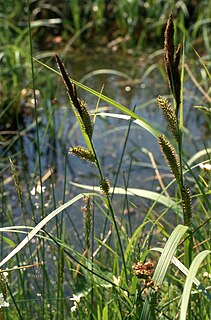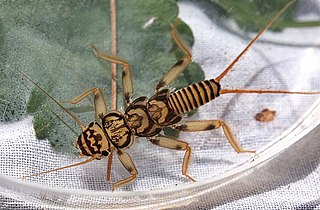
Convolvulaceae, known commonly as the bindweed or morning glory family, is a family of about 60 genera and more than 1,650 species of mostly herbaceous vines, but also trees, shrubs and herbs, and also including the sweet potato and a few other food tubers.

Acroneuria lycorias or the boreal stonefly is a species of stonefly native to North America. It was first described by Edward Newman in 1839. The species is named after the Nereid Lycorias of Greek mythology.

The Perlidae are a family of stoneflies, with more than 50 genera and 1,100 described species. The majority of the Perlidae are found in eastern North America, but they occur worldwide except for Antarctica and parts of Africa. Their lifecycles range between one and three years. They adults emerge in the summer; they are very active and known to be attracted to light sources. They are usually very sensitive to changes in environment.
Vitex evoluta is a species of plant in the family Lamiaceae. It is endemic to New Caledonia.
Duplicaria evoluta is a species of sea snail, a marine gastropod mollusk in the family Terebridae, the auger snails.

Carex riparia, the greater pond sedge, is a species of sedge found across Europe and Asia. It grows in a variety of wet habitats, and can be a dominant species in some swamps. It is Britain's largest Carex, growing up to 130 cm tall, with glaucous leaves up to 160 cm long. It hybridises with a number of other Carex species, including the closely related Carex acutiformis – the lesser pond sedge. A variegated cultivar is grown as an ornamental grass.

Acroneuria internata is a species of stonefly in the family Perlidae. The scientific name of this species was first published 1852 by Walker.

Acroneuriinae is a subfamily of common stoneflies in the family Perlidae. There are about 32 genera and about 520 described species in Acroneuriinae.

Acroneuria abnormis, the common stone, is a species of common stonefly in the family Perlidae. It is found in North America.

Acroneuria is a genus of common stoneflies in the family Perlidae. There are more than 30 described species in Acroneuria.
Milesia scutellata is a species of syrphid fly in the family Syrphidae.
Mixogaster breviventris is a species of syrphid fly in the family Syrphidae.
Acroneuria arenosa, the eastern stone, is a species of common stonefly in the family Perlidae. It is found in North America.
Chrysotoxum chinook is a species of syrphid fly in the family Syrphidae.
Aradus funestus is a species of flat bug in the family Aradidae. It is found in North America.
Sphecomyia nasica is a species of syrphid fly in the family Syrphidae.
Spilomyia liturata is a species of syrphid fly in the family Syrphidae.

Acroneuria carolinensis, the Carolina stone, is a species of common stonefly in the family Perlidae. It is found in North America.
Animal Ethics is a nonprofit organization formed to promote discussion and debate around issues in animal ethics and to provide information and resources for animal advocates. They also do outreach work in several countries on the issue of speciesism. Their aim is to create a world where moral consideration is extended to all sentient beings. The organization's website covers topics such as speciesism, sentience, veganism and wild animal suffering and has content translated into several languages.
The evolving miner bee is a species of miner bee in the family Andrenidae. It is found in North America.






